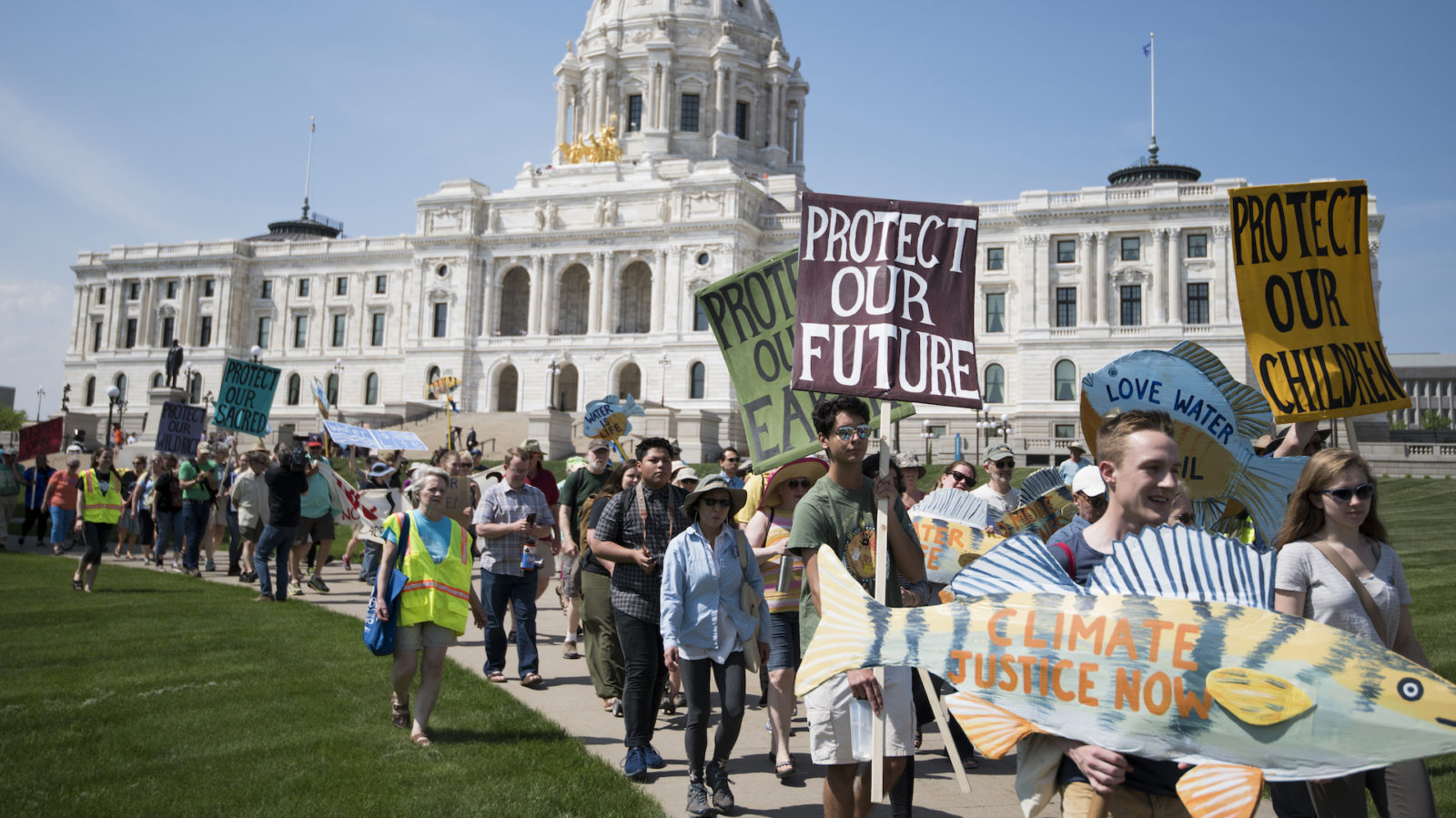Earlier this year, a forecast analysis was released by the International Energy Agency (IEA) detailing pathways to achieve net zero emissions by 2050. Notably, the report indicates that existing government pledges will not achieve the goal of net zero by 2050 and that transformational changes to our energy systems must begin immediately. In order to limit warming to 1.5℃, the IEA lays out more than 400 milestones the world must meet if we’re to keep as close as possible to 1.5ºC of warming.
Among those milestones is a landmark recommendation: every country needs to stop investing and developing new fossil fuel supply projects this year. The report went even further, and recommended ending the sale of internal combustion engine (ICE) cars by 2035 and significantly ramping up clean energy technologies, deployment, and innovation.
Recent analysis from the Fossil Fuel Non-Proliferation Treaty Initiative further supports efforts to end fossil fuel development, finding that “existing coal, oil and gas production puts the world on course to overshoot Paris climate targets. The report analyzes global renewable energy potential, and finds that every region on Earth can replace fossil fuels with renewable energy to keep warming below 1.5ºC and provide reliable energy access to all.” This is a critical turning point, and it’s one we can’t afford to ignore. The research is telling us that there’s more than hope for the future of life on this planet. The solutions to this crisis are already in our hands, but what’s lacking is the will to wholeheartedly commit to creating the sustainable and prosperous future the world needs.
With such compelling evidence that it’s more than possible, transitioning to renewable energy systems is simply a no-brainer. The data to support this conclusion is only growing, with report after report detailing that humans are more than capable of achieving a future free of fossil fuels. Yet despite the overwhelming research suggesting the world can, and must, move away from planet-warming fuels, many fossil fuel projects and proposals continue to move forward.
IEA Says “Open the [Oil] Taps”
As the world begins to reopen from closures resulting from the COVID-19 pandemic, demand for fossil fuels has also started to rise. After a significant decline in consumption during 2020, oil is set to make a comeback this year and slated to exceed pre-pandemic levels by 2022. Less than a month after the IEA released their net zero report, their June 2021 Oil Market Report told producers to “open the taps” in order to maintain supply and meet demand. The move, which the agency noted runs contrary to their own previous calls to action, is sending mixed signals to global energy markets.
While the IEA calls for no new fossil fuel developments one month, the following month it’s turning around and asking oil to ramp up production. If the world needs to immediately transition away from fossil fuels, shouldn’t the IEA be encouraging the deployment of clean energy in order to fill the gaps in global energy demands? This brazen call for more oil contradicts their own messaging and, ultimately, gives countries the green light to increase fossil fuel production. This is counterproductive to limiting warming to 1.5ºC and in line with the Paris Agreement.
Pipelines Keep Pumping
While the IEA goes back and forth on strategies for the future of our global energy systems, Indigenous, community, and environmental advocates are on the ground fighting the physical construction of fossil fuel infrastructure.
When President Biden took office in January, he signed a suite of executive orders focused on climate and the environment. Among those orders was the revoking of a crucial permit for the Keystone XL pipeline, which has been opposed by advocates for decades. Just this month, the energy company developing the pipeline abandoned the $8 billion project after more than ten years of battling for its survival. So while environmentalists and Indigenous communities celebrate the end of the pipeline, the fossil fuel fight is far from over.
Advocates have recently been fighting tirelessly against the Line 3 pipeline, which would deliver crude oil from Canada through Minnesota to Wisconsin. It has quickly become a major focus of climate and environmental advocates who are once again calling on President Biden to intervene to stop the development of the pipeline. The move to cancel one pipeline but let others continue goes against Biden’s promises on climate, and his goal of transitioning towards renewable energy.
Moreover this month, the Minnesota Court of Appeals upheld a key permit for the Line 3 replacement, citing that evidence supports the pipeline’s approval from the Minnesota Public Utilities Commission. In short, construction can continue on the Line 3 replacement. The aforementioned studies indicate that we need to stop this kind of expansion of fossil fuel development and instead ramp up renewables, so why are the governing agencies still giving their approval?
Judge Says Sale of Land Within the Arctic Refuge Must Continue
As activists put their lives on the line to stop fossil fuel expansion, a federal judge moved to continue the sale of Arctic National Wildlife Refuge parcels for oil and gas drilling. The circumstances surrounding the sale of this land for fossil fuel development were, unfortunately, written into law as part of the Tax Cuts and Jobs Act passed under President Trump.
Judge Terry A. Doughty of the Western District of Louisiana ruled that Biden could not stop the sale of the Arctic National Wildlife Refuge and that the power of the President cannot override federal law. Therefore, the relevant federal agencies must get back on track with managing the sale of leases for drilling in the Refuge. While the ruling moves to continue the extraction of fossil fuels on U.S. land and further contribute to the climate crisis, it also ignores and jeopardizes the inherent ecological and cultural values of the refuge.
The Arctic National Wildlife Refuge is one of the largest and most pristine lands in the world. The Refuge provides a niche habitat for numerous species, including polar bears, caribou, wolverines, and nearly 200 different bird species, which all rely on this land for survival. The refuge has also been home to and sustained Indigenous communities for thousands of years. The Gwich’in are made up of 15 different communities spanning from northeastern Alaska to areas of northwestern Canada, and it’s estimated that they’ve been living on this land for nearly 20,000 years. The Gwich’in — who sometimes refer to themselves as “Caribou People” — have long relied on porcupine caribou, a species native to the refuge, for “food, clothing, tools, and are a source of respect and spiritual guidance for the Gwich’in.” The caribou is sacred to their way of life, and the sale of this land for fossil fuel development threatens thousands of years worth of tradition.
A quote listed on the Gwich’in Steering Committee’s website from elder Jonathon Solomon of Fort Yukon, Alaska, reads: “It is our belief that the future of the Gwich’in and the future of the Caribou are the same. Harm to the Porcupine Caribou Herd is harm to the Gwich’in culture and millennia-old way of life.”
Once again, the powers that be continue to ignore the extremely harmful impacts on Indigenous people, the environment, and our climate that accompanies the continual development of fossil fuels.
U.S. Financial Institutions Continue to Bankroll Fossil Fuels
Despite meek commitments to being net zero by 2050, many of the top U.S. financial institutions continue to push millions upon millions of dollars into bankrolling fossil fuel companies and their projects. Since the signing of the Paris Agreement in 2015, the top financiers of fossil fuels — JP Morgan Chase, Citi, Wells Fargo, and Bank of America, all U.S.-based firms — have financed a combined $975 billion to fossil fuels.
This doesn’t exactly align with the primary goal of the Paris Agreement to limit the warming of our climate. If these institutions are continuously willing to fund fossil fuel projects, then there’s no incentive to stop. And with the IEA saying things like “open the taps,” the industry may still feel very much supported. These maintain fossil fuels’ social license to operate. It demonstrates that, although we know we shouldn’t be funding and supporting fossil fuels, we’re going to continue to do so.
What’s worse, as we reopen economies across the world and the demand for energy rises, we’re filling this gap with fossil fuels instead of investing in increasing clean energy capacities. This benefits fossil fuel investors, further incentivizing continued monetary value in keeping fossil fuels around.
Emphasizing the Need for Actual Climate Action
The fossil fuel economy continues to devastate the delicate balance of our ecological and climatic systems. In 2021, the concentration of atmospheric carbon dioxide reached 419 parts per million (ppm), the highest ever recorded; the surface temperature of the Arctic reached a startling 118℉; and the Western U.S. is facing unprecedented heatwaves and droughts, exacerbating risks for the upcoming wildfire season. What we’re seeing now is the climate crisis laying bare the severe impacts in store for communities and our environment if we don’t start mitigating the rapidly accelerating climate crisis.
There has never been a more pressing need for the U.S. and the world to seriously wean ourselves off of our devastatingly harmful fossil fuel reliance. The research tells us it’s possible, in fact it’s possible with the technology we already have. What we need next is the will to move the needle and kickstart this transition to a more sustainable and prosperous society. A better future is in our grasps, we just need to reach out and grab it.









